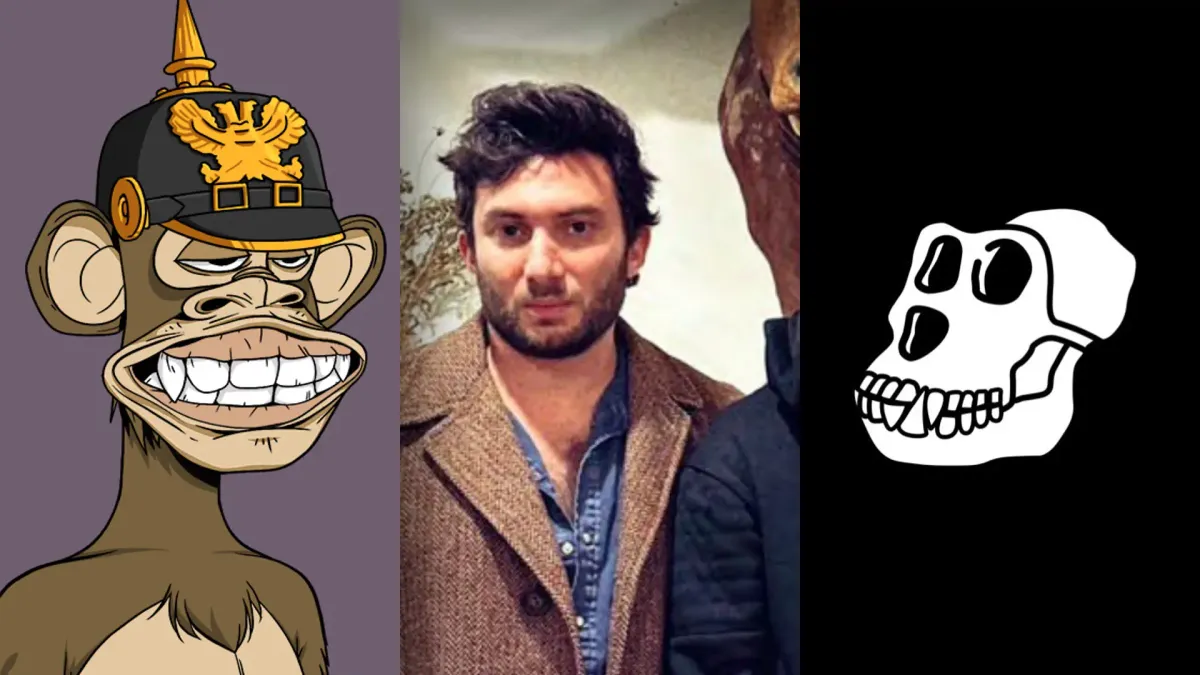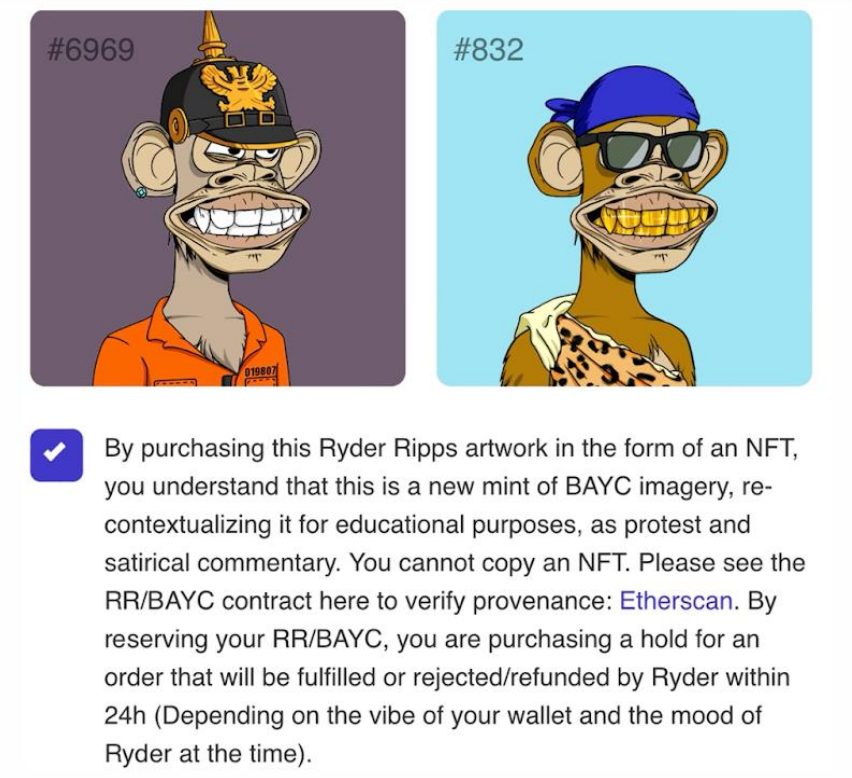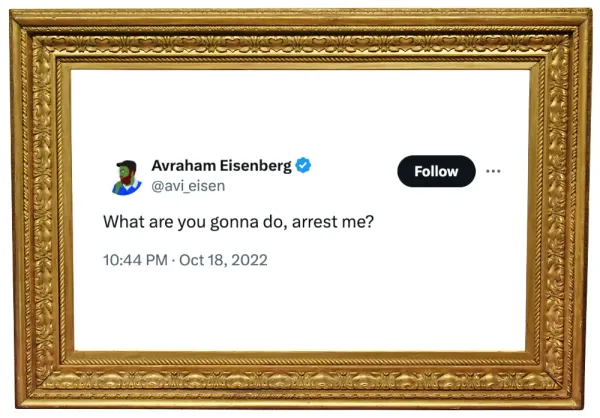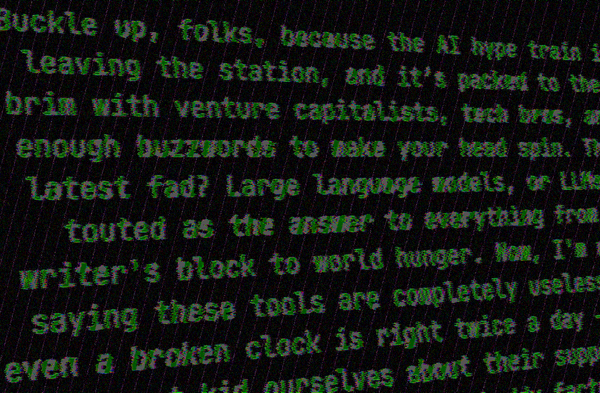"The Monkey Fraud": An interview with Ryder Ripps
An interview with Ryder Ripps, a defendant in the Yuga Labs v. Ripps case about Bored Ape Yacht Club trademark infringement and racism.

Those of you who have been following my work for a while know that I am somewhat fascinated by the ongoing court case between the most powerful company in NFTs and an artist who decided to create his own reproduction of the NFT collection, using the images from the original. I have covered it in more than a few issues [I13, 14, 25, 43, 44, 51, 53].
Much of my interest stems from curiosity to see some of the as-yet mostly theoretical legal concepts around NFTs actually litigated. Some of it comes from my general disdain for the plaintiff, Yuga Labs. Some of it is just rubbernecking at high-drama crypto litigation, a hobby I've taken up over the past few years.
The plaintiff in the case is Yuga Labs, an NFT company supposedly valued at $4 billion (in 2022).1 Their flagship project is the Bored Ape Yacht Club: a collection of 10,000 procedurally-generated cartoon busts of apes that have arguably become the best-known symbol of excess in the NFT world. In fact, one of them graces the logo of Web3 is Going Just Great.


W3IGG logo and Bored Ape #5262
During their heyday, some of these NFTs supposedly changed hands for over $1 million — though rampant wash trading in the NFT world2 and allegations against Yuga of market manipulation3 and under-the-table celebrity deals4 should make you highly skeptical of such claims.
Since launching the Bored Ape project, Yuga Labs has launched spinoff projects like the Mutant Apes, and has acquired some of the other most prominent NFT projects, including CryptoPunks and Moonbirds.56
The defendants in the case are artist Ryder Ripps and crypto personality Jeremy "Pauly0x" Cahen. Towards the end of 2021, Ripps came to believe that Yuga Labs had included neo-Nazi symbolism, alt-right dogwhistles, and racist elements in the Bored Apes project. He later created a website called GordonGoner.com — named after the pseudonym of one of Yuga's co-founders, who was later identified as Wylie Aronow by BuzzFeed News' Katie Notopoulos7 — to lay out some of his arguments. Ripps also aggressively repeated these allegations on social media, and the allegations have since been covered by CNN and in the Daily Dot, as well as elsewhere.
In May 2022, Ripps and Cahen created RR/BAYC: an NFT project in which people could send Ripps 0.1 ETH (~$200 at the time) to receive an NFT that used the same image as the buyer's chosen BAYC NFT. The website he created also included a description describing the project as appropriation art protesting the Bored Apes.

Yuga Labs sued Ripps and Cahen for trademark infringement, cybersquatting, false advertising, unjust enrichment, and related claims in June 2022.8 The case has been messy since day one, with Ripps viewing the case as a thinly-veiled attempt to suppress his free speech and artistic expression, and attempting to litigate it as such. This hasn't gone terribly well for them, and in November they were ordered to pay almost $1.6 million in disgorgement and damages (mostly disgorgement — apparently there's $1.3 million to be made in duplicate apesa) [I43]. That's only a part of what they've been ordered to pay, though, as the judge overseeing the case found that they had been "obstructive and evasive throughout their depositions and during their trial testimony," and had "unnecessarily and inappropriately made disgraceful and slanderous statements about Yuga, its founders, and its counsel". Based on that, he ordered them to pay Yuga Labs' attorney's fees, which were calculated at around $7 million [I51]. Ripps and Cahen have filed an appeal, which is pending.910
Throughout my coverage of this saga, I've tried to be fair, though I certainly have my own opinions on the parties and on the case. I don't think my feelings about Yuga, which I've covered very critically in the past, are any particular surprise or secret. And I think this lawsuit was a really weird move on their part, given the prevalence of BAYC knockoffs. It's hard to see it as anything but them lashing out at Ripps and Cahen for their racism allegations via tangentially related litigation, and it was guaranteed to bring only more attention to those allegations.
Generally speaking, I do enjoy watching individuals be the thorn in the sides of large companies I dislike, and I give Ripps and Cahen my kudos for that. However, I have always had some skepticism towards the defendants. It's been a little hard for me to grasp how releasing a mostly identical NFT project and making over $1 million off those NFTs is legally-protected artistic speech — although I will say that hearing Ripps' side of the story outside of the veneer of legal filings has helped me a little bit there, and I enjoyed hearing his take on NFTs as a medium. I did find some of Ripps and Cahen's accusations and actions throughout the suit to be pretty over-the-top, though (for example, claiming that Yuga's lawyers are "criminals" who endorse "racism, antisemitism, bestiality, [and] pedophilia") [I43], which also influenced my feelings about the case.11
It originally seemed to me that perhaps the goal was to provoke the lawsuit, and through that draw attention to their claims without necessarily expecting to win. I suppose they've succeeded in that goal, whether it was their intent or not.
Despite my somewhat mixed feelings toward the defendants, in the end I was surprised to see such a massive judgment against them. Regardless of how you behave in court, it still seems pretty wild to me than two individual defendants have found themselves owing five times the judgment amount in legal fees to a multi-billion-dollar corporation. Even if they don't succeed on appeal, I'll be curious to see if the judgment is adjusted downwards.
Anyway, with all that background out of the way, it came to my attention somewhat recently that both Ripps and Cahen felt I'd been giving them short shrift in my coverage. Cahen expressed it first on Twitter, accusing me of jealousy towards him and Ripps, and "dickriding the companies you claim to be a critic of". In a previous conversation, I had tried to ask him a question about the ongoing case, but he never replied.
However, I received an email from Ripps not long after Cahen's "dickriding" tweet, where Ripps also expressed that he felt my coverage of the case had been biased against him. In his email he seemed open to talking about it, and so I replied, and also asked if he might be willing to do an on-the-record interview.
He agreed.
I've included the unedited written interview below. Any links within the interview text were included in the original by Ripps. Views are, of course, his own. However, all footnotes are my own annotations.
MW: What motivated you to put so much time, energy, and money into your campaign against Yuga and the BAYC project?
RR: First off, thank you for taking the time to inquire into this. Many have attempted to silence the ideas and the work. For instance, as it stands now, I am not allowed to mention certain terms contained in your question due to a court-ordered injunction. So when I say "monkey fraud" or "the monkey fraud company", I assume everyone will understand what and who I am talking about. Unfortunately, this is the only way I am legally permitted to address the case until it is appealed in the 9th circuit. This sounds absurd, but my lack of freedom of speech is not hyperbole; it's very real as they have already threatened further litigation.
I was first motivated to speak up against the monkey fraud in 2021. Having worked in entertainment and been a digital artist, I knew the monkey project was corrupt on many levels: paying celebrities to promote unregistered securities under the guise of high-tech art, proposing that NFTs could be a contractual agreement to transfer intellectual property without clear terms, or pretending that there was even any intellectual property to transfer. In short, the monkey fraud makes a mockery of the blockchain, technology, art, law, and culture. The owners of the company are self-admitted "shit coin traders"b and their monkey fraud is simply a clever way to fleece the naïve and gullible masses into buying unregistered securities in the phony packaging of art, a club membership, intellectual property rights, or a metaverse. In each of these instances, simply using a traditional MySQL database hosted on a private server would be much more efficient and legal. Simply put, there is no real product and there never was –only forced use cases for unregistered securities.
To me, the monkey fraud represents a microcosm of society's greatest ailments. As a microcosm, it's easier to observe and address; thus, I am drawn to do so. I am also forced to continue to stand up for myself now, as the alternative is to let a company take away my rights and freedoms, or murder me and my family – a desire they have stated in court.c
It feels like each year that goes by, the fabric of reality gets chipped away at more and more. If you told someone in 2018 that an unknown person, who goes by "Gargamel", created hip-hop ape cartoon JPEGs and convinced Shaq and Gwyneth Paltrow to pretend to spend half a million dollars to own said ape JPEGs on the blockchain, and then actually sold them for millions of dollars to lonely people online; most people would find it far-fetched and call the racist venture insane. But here we are: a company, who was business partners with the largest American fraud (FTX)d and was allegedly worth four billion dollars, who is creating video games nobody plays (where you take a key out of a monkey's butt)e and spending $20 million+ to harass mef because I made art about their blockchain monkey scam. And somehow, to many, this seems normal. After 9/11, the confines of reality expanded, and I think COVID was a similar event; the obviously strange became increasingly banal and acceptable. Our threshold of accepting the absurd is ever expanding, to the point of nearly falling off a cliff. The saga with the monkey fraud company has felt like an episode out of The Twilight Zone, where Madonna's Israeli manager (Guy Oseary) and Paris Hilton got swindled into promoting a trite racist monkey cartoon from accelerationist 4chan crypto-fascists and people ate it up because of greed, ignorance, obsession with celebs (no father figures or God), and long COVID brain fog.
This cause is worth dedicating myself to in order to protect myself, my friends, my family, and my freedoms, as well as a means to verify reality and truth.
Luckily, it is not just me; nearly everyone in the real world hates the monkey scam. It's only still liked by a group of about 1000 brainwashed people and their demented puppeteers who all adulate each other in a Twitter echo chamber. The value of the NFTs today is only from high-volume wash traders on blur with bots who might as well be day trading penny stocks. It has nothing to do with the "art" or anything else besides trying to prop up a market for the next sucker (or bot) to sell their trash to.
MW: This is not the first art project you've created that involves reproducing other well-known NFTs — for example, your CryptoPunk reproduction in 2021. Was that motivated by similar concerns, or unrelated?g
RR: My monkey protest art project incorporated a few themes from my CryptoPunk 3100 remint. "Reminting" is a term I coined for taking the image link contained within one NFT and placing it in a new one, thereby changing the context, as a form of appropriation art. An NFT is merely a row in a spreadsheet that is hosted on a decentralized blockchain network, as opposed to a private server (like Google or Facebook). As such, the purpose of an NFT is related to the data it stores. In the context of digital art, the data in an NFT can serve as a useful means to establish provenance which is critical to understanding its value and meaning.
In traditional art, one could establish the origin of a work through physical examination or by researching sales records to establish a chain from its current location to the hand of the artist. In the case of digital art, establishing provenance presents its own unique challenges. An image uploaded online can be saved, remixed, and reuploaded, causing its origin to get lost in the vast flowing feed. This problem is primarily what NFT technology sought to address when it was invented in 2014 by Kevin McCoy and Anil Dash. Art changes the world through the ideas within it. By nature, ideas cannot be copyrighted or trademarked; they are free, and the best ideas are designed to spread widely and be owned by everyone. That is why powerful art is valuable because of its proximity to the origin point of a famous idea. Ideas become famous because of their power and widespread adoption. The best ideas, like the wheel or the t-shirt, require no author, as their power is obvious and omnipresent. Perhaps this is why the inventor of Bitcoin chooses to remain anonymous. The purpose of the decentralized blockchain, as put forth by Satoshi Nakamoto, is to create a "trustless" and "permissionless" system – a computer program that removes human flaws such as lying or tyrannical control to transact and mine freely. It is a simple idea that can revolutionize society by removing the fetters of opaque state-controlled inflation. The internet, in general, has always had aspirations of being free and open. Ever since the beginning, you can read Tim Berners-Lee's work or Lawrence Lessig's ideas about “code as law,” or understand the pursuits of Aaron Swartz. I believe that NFTs could fit into the good ideals of the internet's story. If we respect the concept of code as law, NFTs are a method of establishing provenance by decentralizing data attached to works. For most people, this is not a need, as most people don't care about digital art. Those who don't understand NFTs often say things like, "Oh, but you can just right-click and save the image. Why would anyone pay for that?" and they are completely correct. If an NFT is understood as an image, divorced from the data, then they are certainly right. The creators of the monkey fraud don't understand the usefulness of NFT in establishing provenance. Instead, the company comes up with nonsensical reasons for consumers to spend thousands of dollars on monkey JPEGs; such as the idea that an NFT is conveying IP rights to an image. But they did not think any of this through. How could IP rights be transferred without any contractual terms or even nationalities to establish which jurisdiction these rights would even apply? Additionally, blockchain transactions are pseudonymous and inefficient for complex contract law, such as intellectual property conveyance, as there are not even real names attached to the NFT transfers. How could you have a contract between two parties without names? Crypto scammers are often trying to pull the wool over the public's eyes in various ways, as a means of selling unregistered securities. It is for this reason that the sanctity of art's purpose in NFT has been missing and it goes unchecked since intellect is purely market and click-driven. The goal of the CryptoPunk 3100 remint was to prove a point about NFTs – that their value does not lie in the image, which is free and, by being on the internet, ideally, should be freely shared/consumed; rather, the value is in the metadata. It's through the metadata that meaning is brought, and meaning is value. The transposition of context is the primary artistic device of appropriation art – a toilet in a gallery has new meaning (Duchamp), a banana taped to a wall with a high price tag has new meaning (Cattelan), a blown-up picture of an everyday soup can with new colors has new meaning (Warhol), another Xerox of a soup can that's a copy of the copy of a soup can also has new meaning (Bidlo). When I minted CryptoPunk 3100, I brought new meaning to what was a commercial thing, putting the "punk" back in "CryptoPunk," and proved you can't copy an NFT; the metadata (the NFT) is just a container to understand an expression. When I created commentary about the monkey fraud, something similar was employed. By reminting the same images in new NFTs, authored by the monkey fraud's most prominent critic, I was able to exercise the power of context—how the same image can have completely different meaning depending on the context of where that picture sits. Some of the most powerful symbols in history have employed this technique of recontextualization, such as the Christian cross, a brutal symbol of torture becoming a victorious symbol of redemption/love/devotion/purity, or the Nazis directly and intentionally taking the peaceful symbol of the Swastika from Eastern religion and literally flipping it to mean the opposite. Which is similar to what the monkey fraud company did with the ideals of cryptocurrency and art, that I am flipping back with my work.
MW: Was provoking a lawsuit from Yuga Labs among your original goals when you created the RR/BAYC project? Or was it unexpected?
RR: The monkey fraud company is a massive lie in just about every way imaginable, representing the antithesis of what cryptocurrency and the internet has traditionally stood for. Fighting to correct it was always the goal, but I have been perpetually surprised by how committed Greg Solano and Wylie Aronow (founders of the racist monkey fraud company) are to being insidious liars and a court that doesn't take the time to read their filings, simply rubber-stamping legal error. I thought the US courts generally read proposed orders not just copied them verbatim, I was completely wrong there. Their lies are almost comical, for instance they claimed my conceptual art in the form of "fake monkeys on the blockchain" caused over $700 million dollars of damage, yet they also claim they don't have a single email or internal memo discussing the damage this caused because they “don't use email”. In order to quell my free speech rights under the feigned pretext of trademark infringement, they have to pretend that I was never protesting their scam, while their own fans understand this entire lawsuit as a defamation suit because I was calling them out for being racist Nazi scammers for years. They also have to pretend there never was any speech involved in my conceptual art project, which meant not acknowledging that the website of the art project they are suing me over had words on it. They have to pretend they had nothing to do with a fraudulent crypto currency called “Apecoin” which is the official currency of their metaverse that does not exist.. Meanwhile they also claim in their lawsuit against me they own the word “Ape,” the coin itself has the logo the monkey fraud company uses on it and “ApeCoin.eth” was created by Wylie Aronow, the founder of the monkey fraud company. Another such comical example of their fabrications is when Greg Solano, wrote in a signed court declaration that I have a history of scamming with NFTs because I "sold the entire CIA as an NFT", referring to a humorous work of mine where I was obviously making a joke about ownership. Greg had to pretend like I was actually trying to fleece someone into buying the entire CIA for $2,000.h In this case I guess he doesn't mind making himself look like a dense moron as long as it might hurt me. Logic I will never understand, but the extent of, is funny to ponder. I wonder if he would eat his own poop if it means I go to jail.. That's the logic we are dealing with here.
MW: Regarding the recent sanctions request [I53], I noticed your reply didn't address Yuga's allegation that "It is not credible that Mr. Ripps would delete his private keys to inadvertently avoid violating the order when he continued to use at least one of the wallets for 45 days after the Court’s order", and that it is impossible to "inadvertently" use a cryptocurrency wallet. Are you able to address that?
RR: Another theme of this case has been the monkey fraud company intentionally misconstruing technical jargon in their favor knowing most people don't understand it and just say, "Oh gee that technical stuff sounds really bad!". It's like the old joke, "Your epidermis is showing.” They use such prevarications throughout their scam, for instance, this family guy episode is indistinguishable from this video trying to explain one of their nonsense video games (a means to complicate the simple fact they are just selling unregistered securities). Yuga Labs has hackers ("security experts") on staff and has sent private investigators to harass my friends and family. Their hackers have been detained by federal agents for suspicion of carrying out mass fraud. I felt that deleting my seed phrase and private keys would be wise to insure I was abiding by the original court-order and so their hackers did not get access to my computer and lie I was creating more of my monkey fraud protest artworks on the blockchain nor could there be any activity on my wallet that would cause them to burden the court and myself, as it turns out they will do this for just about anything.i The fact they spent over $20 million dollars so far on this frivolous case and are burdening the court with the idea that there are "fake monkeys" existing somewhere out there on the blockchain in a dormant wallet, instead of a null wallet (burn address) which is somehow causing their brand great harm (no evidence of anyone besides them giving a fuck or even noticing) is ridiculous and pathetic.. it tells you all you needs to know about the level of desperation these people are in to attempt to hurt me, in this case, attempting to throw me in jail for not being able to send them conceptual art spreadsheet rows that made fun of their monkey NFT scam because I listened to a court-order before they modified it. We live in a world where rich petulant LARPers dedicate themselves to such pointless vindictive pursuits instead of just delivering a monkey metaverse like they promised two years ago.. What happened to the "Otherside?" their fake video game they promised people they would make and charged them like $400 million on?j Simply fraud, never will be released.
Sorry I lost track.. but I must say, I do find the original question interesting though. The fact that this point is even something that is known is indicative of how the monkey fraud company works with the press – selectively seeding one sided anecdotes their lawyers write, from a lawsuit that contains hundreds of thousands of pages that nobody has the time or energy to parse (or cover). Exploiting this exhaustion is key to controlling the masses in general. As I stated before, this case really represents a microcosm of the larger world.. a world where if you have money to spend you can make a lot of things go in your favor. In the course of the past three years, the monkey fraud company has repeatedly manipulated and intimidated the press. They threatened to leak false reports about a CNN reporter to get them to stop writing negatively and they redirected at least three other publications through threats or nepotistic favors in order to halt negative reporting about the truth of their scam. I have proof for all of it if anyone doubts anything I have said.k
MW: Roughly how much have you spent on your legal defense thus far? I'm trying to get a sense of the overall cost of the lawsuit (though I recognize this is TBD with the appeal outstanding and ongoing litigation related to that).
RR: I have spent all of my money litigating it and emptied my retirement savings. Yuga Labs knows I am not rich and don't come from a rich family, but they have still pursued this litigation for purely their punitive delights to get back at me for exposing their scam and effectively making fun of them. I think their entire lawsuit is an extension of their trolling, making a mockery of the justice system after they made a mockery of art, finance and consumer culture.
MW: Some defendants in crypto-related cases have had success in using crypto to crowdfund legal expenses, such as when MachiBigBrother tried to sue ZachXBT or Ben Armstrong tried to sue Atozy. Is that something you've tried, or considered trying?
RR: I don't really want innocent supporters to have to pay for the monkey company's fraudulent and predatory lawsuit, that seems unethical as well. I'd rather God pick up the tab. This is protest art, and we are fully aware that the protest can take everything from us. Our appeal is very strong and we believe the situation will be corrected without having to beg on the timeline. Tyranny and inequity festers in silence. With the help of our lawyers, Jeremy Cahen and I choose to stand up for ourselves and our principles.
MW: Would you consider the project to be a success? On the one hand you may end up owing millions; on the other, it has certainly helped to draw attention to your concerns around BAYC.
RR: Yes it's a success, it proved they are Nazi's and that my monkey fraud protest art on the blockchain is powerful enough to spend tens of millions on, they love my art, it's worth millions to them. Our message has reached millions already, and the job is still ongoing. We have also saved untold thousands of innocent people from being preyed on by this cultural and financial fraud. There are multiple US government investigations into the fraud of this company and their partnersl as well as a large-scale class action (really worth reading) that names many of the celebrities involved in the grift too – I am not alone in standing up against this company, I am just alone in using conceptual art to do it 🙂
MW: What does the future look like for you if the judgment is upheld on appeal?
RR: Unsure, not thinking about it. But read it and let us know what parts could be improved,
https://gordongoner.com/Yuga-v-Ripps-Appeal-Opening-Brief.pdf
When the monkey fraud company’s lawyers, Fenwick and West (who also represent many other crypto scams such as FTX), called me to the stand in a bench trial to testify, they only asked me one irrelevant question. After filing thousands of papers and having a team of 10 lawyers working countless hours for over a year, my voice is so powerful that they couldn't even attempt to expose me on the stand. Knowing my voice has that kind of power gives me a lot of satisfaction, so in a way I win if they let me speak or they don't.
MW: What have you been working on lately? Have you been creating other art projects, or mostly focused on the suit?
RR: Tring to get my life back in order after this company took away so much and watching in delight as their pathetic scam crumbles.. All of their unregistered securities are down about 95% from their all time high. Watching God to pick up the pieces has been a joy.
Note: I didn't include an audio version of this newsletter because it feels weird to read a two-party interview out loud. Apologies to those who prefer the audio version.
Footnotes
Duplicapes? ↩
"That’s when we came up with Bored Ape Yacht Club. The idea was that it was this place for degenerates to go, right? Because that’s who we were. We were they guys who aped into every f**king s**tcoin. We kind of are that person." — "Gordon Goner", aka Wylie Aronow, to CoinDesk in September 2021 ↩
This stems from allegations by Ripps in a counterclaim that Yuga Labs' Brand Lead Noah Davis had called Ripps' 72-year-old father and threatened: "You and your fucked up son are going to die."12 Yuga responded by claiming that Rodney Ripps and Davis "had a longstanding personal relationship (predating Davis’ employment with Yuga Labs) that had turned ugly, and that the call was prompted by Rodney Ripps tweeting highly insulting statements about Davis’ late father and Davis himself."13 The tweet by Ripps' father that Yuga cited as an illustration of such a "highly insulting statement" was "Son of Mac Davis, trust fund kid. Salesman at Christie's last year when I put a piece of art up for auction. No way an artist. Never heard of him in over 40 years in the art world. Father, Mac was a cool singer. RIP".14 This portion of the counterclaim was later stricken and dismissed without leave to amend and with prejudice.15 ↩
Ripps and Cahen go into more detail on these allegations in a document published on GordonGoner.com. ↩
This is a reference to Yuga Labs' Dookey Dash, which is as bad as it sounds. ↩
Although Yuga Labs was ultimately awarded around $7 million in attorneys' fees, they claimed they had actually paid around $13.2 million in fees.16 ↩
Although Yuga Labs now owns the CryptoPunks collection, this occurred prior to the acquisition. Ripps received a DMCA takedown notice from Larva Labs (then owners of the collection); he submitted a counterclaim and minted the DMCA takedown notice as an NFT. ↩
This comes from a declaration by Yuga Labs co-founder Greg "Gargamel" Solano, who wrote: "Of course, the RR/BAYC NFTs are not the first scam Defendants have run, nor are they likely to be the last—unless they are severely enjoined from their infringement. When I first searched for Ryder Ripps on Google, the most prominent search result that I saw was an article about how Ripps lied about creating a logo for the CIA. He then used this lie about being connected to the CIA to promote a CIA branded NFT and sold that NFT for thousands of dollars."17 I don't know which specific article Solano saw, but it would have been to do with this incident. This is the NFT in question. ↩
I asked Ripps if he was alleging that Yuga Labs had tried to hack him; he said that he believes that well-resourced companies will go to extremes to protect themselves and that he fears hacking attempts against him. ↩
I followed up with Ripps on this and I do believe — corroborated by my own information — that he has good reason to say that Yuga Labs has taken an extremely aggressive and intimidation-based approach towards critical reporting. As one public data point, in February 2023, CoinDesk published and then removed an op-ed regarding the allegations over BAYC racism. The author later stated that he had been informed by a CoinDesk employee that the story was taken down after Yuga Labs threatened CoinDesk with a libel suit. The story was replaced with a retraction notice and editor's note that "The column by a first-time external contributor was based on inflammatory, unsubstantiated conspiracy theories and as such never should have been published. Accordingly, the content has been removed. We apologize for the editorial lapse."18 ↩
This is, at least in part, referring to reports of an SEC investigation into Yuga Labs, its NFTs, and its ApeCoin cryptocurrency.19 ↩
References
"NFT creator Yuga Labs confirms layoffs as sector value plummets", Silicon Republic. ↩
"Over $30B of NFT Trading Volume on Ethereum Is Wash Trading, Research Suggests", CoinDesk. ↩
Second amended complaint filed on October 17, 2023. Document #179 in Adonis Real v. Yuga Labs, Inc. ↩
"Justin Bieber 'bought' an NFT for $1.3 million. But he didn't pay for it." Dirty Bubble Media. ↩
"Bored Ape Yacht Club creator buys CryptoPunks and Meebits", The Verge. ↩
"Moonbirds is joining Bored Ape’s NFT empire, but can Yuga Labs conquer its growing pains?", Fast Company. ↩
"We Found The Real Names Of Bored Ape Yacht Club’s Pseudonymous Founders", BuzzFeed News. ↩
Complaint filed on June 24, 2022. Document #1 in Yuga Labs v. Ripps. ↩
Notice of appeal filed on February 12, 2024. Document #456 in Yuga Labs v. Ripps. ↩
Brief for appellants Ryder Ripps and Jeremy Cahen, filed on March 2, 2024. Document #14 in Yuga Labs v. Ripps (9th Cir.) ↩
Findings of fact and conclusions of law filed on October 26, 2023. Document #431 in Yuga Labs v. Ripps. ↩
Ryder Ripps and Jeremy Cahen's answer, defenses, and counterclaims to complaint filed on December 27, 2022. Document #65 in Yuga Labs v. Ripps. Quote on page 47. ↩
Notice of motion and motion to strike counterclaims filed on January 18, 2023. Document #89-22 in Yuga Labs v. Ripps. ↩
Exhibit 19 to notice of motion and motion to strike counterclaims filed on January 18, 2023. Document #89-22 in Yuga Labs v. Ripps. ↩
Order on motion to strike filed on March 17, 2023. Document #156 in Yuga Labs v. Ripps. ↩
Statement filed on November 20, 2023. Document #435 in Yuga Labs v. Ripps. ↩
Declaration of Greg Solano filed on July 17, 2023. Document #342 in Yuga Labs v. Ripps. ↩
"A crypto site called out Bored Apes’ ties to Nazi ideology—hours later it retracted the piece", The Daily Dot. ↩
"Bored-Ape Creator Yuga Labs Faces SEC Probe Over Unregistered Offerings", Bloomberg. ↩




